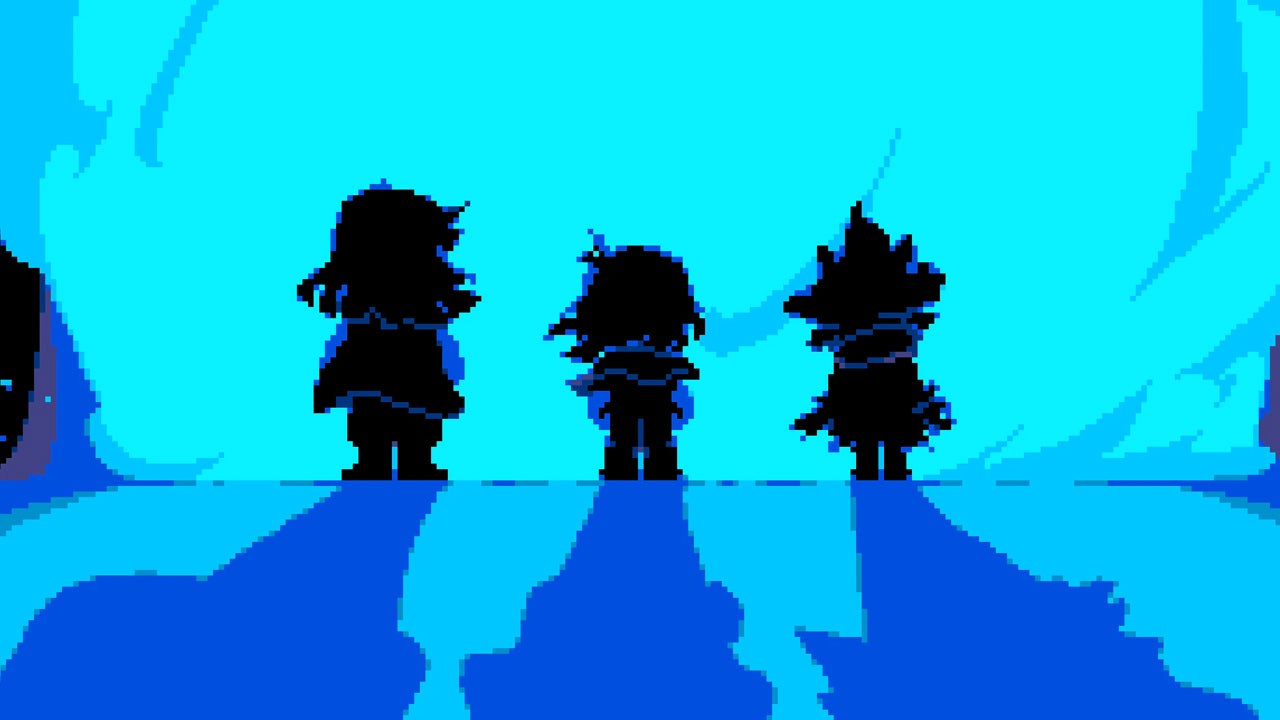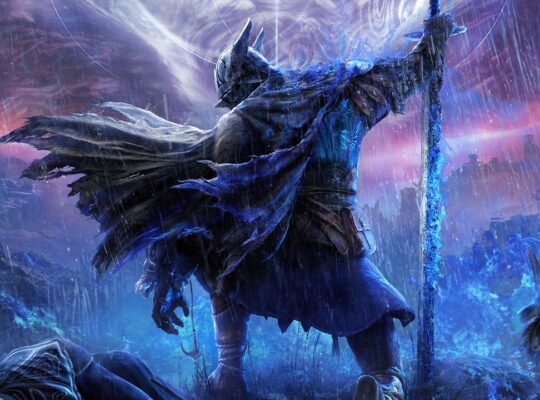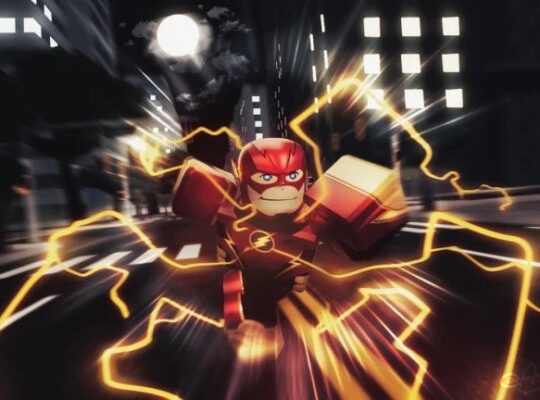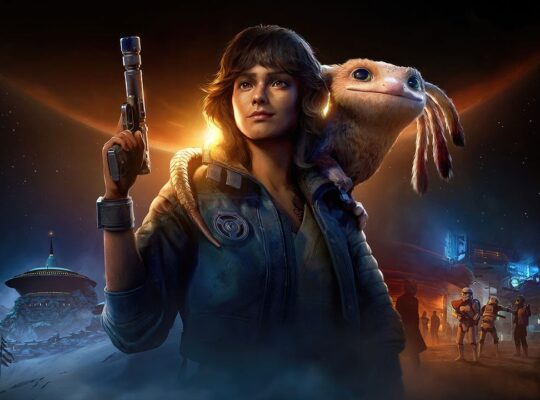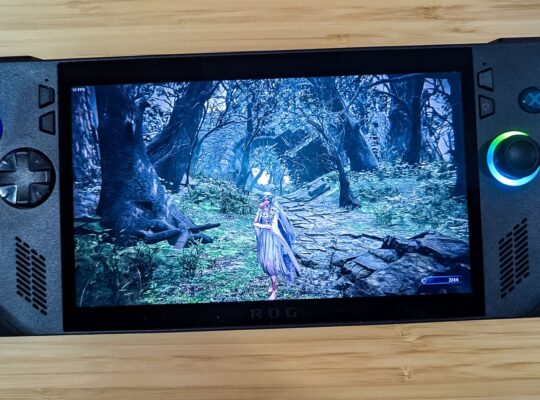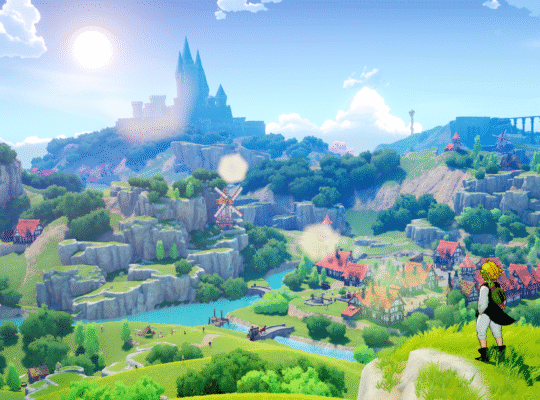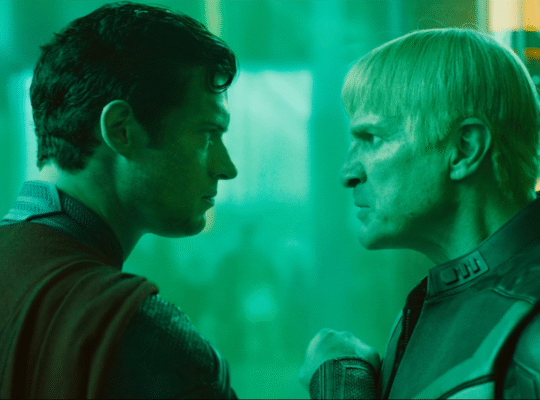
Note: this review contains some small spoilers for Deltarune’s first two chapters.
It was nearly seven years ago on Halloween when I woke up at the crack of dawn to download an ominous “Survey Program” from Undertale developer Toby Fox. It turned out that this program contained not just a simple survey, but the start of a grand adventure that I haven’t been able to stop thinking about since. Now, with the release of the third and fourth chapters, that adventure has truly started to take a more solid shape. Deltarune carries on the spirit of its predecessor by subverting expectations of the RPG genre in the wildest ways. It also shares the same sort of clever, heartfelt, and often absurdly hilarious writing, not to mention a truly unforgettable soundtrack. Don’t be fooled by its deceptively humble pixel art and initially simple plot: there’s a surprising amount of intrigue, beauty, and unpredictability just under the surface. The unsettling questions Deltarune raises about our relationship to the characters we control in games provides an engrossing layer of meta-commentary, while still celebrating the indomitable willpower and heart of extraordinary RPG heroes.
That aforementioned creepy survey demo ended up only being the first chapter of Deltarune, with the second released in 2021, and finally the most recent two arriving just last week as part of its more traditional “full” release – although, that’s not to say it’s “finished” now, as more chapters are planned to arrive as free content updates in the future. But no matter if you are picking up where you left off years ago or starting fresh from the first chapter, you’ll be unceremoniously thrust into the body of a weird teen named Kris. There are a lot of similarities to Undertale here, but also more than enough differences in its setting and how battles work to set it apart. Where Undertale had you navigating an underground society of imprisoned monsters you either had to fight or befriend, Deltarune begins in a pleasant but unremarkable “Hometown” – though for some reason you’re still the only human around in a world of monsters. The only epic struggles to be found here are trying to stay awake through class, or dodging the extreme embarrassment of seeing your divorced adoptive monster parents run into each other at the store.
If you played Undertale, you might get a kick out of seeing several of that game’s more notable figures living regular lives in this parallel story, but I wouldn’t quite say it’s required. In fact, I’d argue that Deltarune is at its best when it’s not trying to focus on what came before it – funny as those interactions may be. I’ll admit, at first I was a little disappointed to see familiar faces appearing in what was supposed to be a new adventure, but then I realized these aren’t simple fanservice cameos. In another universe, these were imposing boss monsters – kings and queens with terrifying strength and magical powers. Here, they’re just… ordinary townsfolk: teachers, bored police, and struggling shop owners. While they may have a role to play, this story isn’t truly about them.
Instead, things kick off when Kris and a rude, crude monster classmate named Susie find themselves transported into a world of fantasy straight out of an ‘80s adventure movie. Here, pencils and bandaids transform into swords and armor, while forgotten classroom toys or computer lab accessories spring to life as “Darkeners”, many of which will stand in your way. It’s a great touch how even the menus and UI change to reflect this new realm. The environments you’ll find yourself exploring in these “Dark Worlds” are anything but: they’re filled with vibrant and beautiful pixel art backdrops that work in harmony with a stunning soundtrack to capture the themes of these fascinating places.
Happy Feet, Dumbass
It’s not long after arrival in the Dark World that you meet your third “party member:” a lonely Darkener prince named Ralsei who seems to know all about you, and gives you the grand spiel about cleansing dark fountains and saving the world from destruction. You know, hero stuff. To get to your goal, you’ll have to fight your way through enemies, frenemies, misunderstood goofballs – pretty much everything you can think of. As with Undertale, you’ll learn that the path to victory can be forged with turn-based violence or pacifism, but the long-term consequences aren’t as clear cut here. Striking enemies into submission allows you to get stronger quicker, though finding ways to spare opponents will lead to your own Dark World’s Castle Town becoming populated with now-friendly occupants, and may even change how certain scenes play out.
Truly, the best part of battles is the ability to “Act” on your turn – winning over an opponent with enough mercy to spare them, in between dodging an ever-expanding variety of deadly bullet patterns on the enemy’s turn within the confines of a box that pops onto the screen. On paper, this system could easily lose its charm, but here it’s kept entertaining by exceptionally witty and context-sensitive execution. Each foe has different needs that get more complex (and often wacky) the further you delve into these adventures.
Things may start with you ordering a party member to flirt their way toward mercy, but it wasn’t too much later I found myself up against tougher ambulance-themed adversaries. Asking Susie to “Act” instead gave me a challenge: dodge the ambulance-themed bullets on the enemy’s turn to earn more mercy for a risky play (because she doesn’t trust doctors, naturally). Whereas Ralsei’s “Act” would suggest getting hit on purpose instead (because they’re here to… help?), which wasn’t a bad call if I was having trouble dodging already. It’s moments like these where Deltarune’s creative juices are at their tastiest, combining fun contextual commands that blend limitless humor while leaning into the personalities of both your team and the Darkeners you’ll face. Each new encounter left me eager to see what my Fun Squad could come up with, and with a mix of plentiful enemy variety and Dark World areas that never stretched on too long, I never really found myself getting tired of the opponents I came up against.
Even beyond fighting and ACTing, I really came to appreciate how Deltarune’s three party members allowed me to develop synergies and tactics as time went on. Later battles became delicate dances of assigning heals or items, then having one person ACT so that another could spare on the same turn (provided my ACTs were successful). Even the process of dodging incoming attacks provides a new layer of strategy with the ability to “graze” the bullet patterns by moving my little heart icon alongside the attacks or dodging at the last second without getting hit to build a meter necessary to perform certain magical powers. Just like ACTing, certain magic could change depending on the battle to accommodate new strategies and challenges unique to that fight, and often made the risky play to get close to attacks worthwhile.
The Power of Page Breaks Shines Within You
Even when I wasn’t fighting, there was a lot to explore both in and out of the Dark Worlds I visited. Being able to wander around, talk to people, and interact with objects isn’t exactly a new RPG idea. (I have vivid memories of obsessively checking every trash can in a Pokemon game, often leaving disappointed.) But what I believe sets Deltarune apart is the confidence it has in making its world worth stopping in to smell the roses. You might find a container of Ice-E’s Cool Boys Body Spray “Spray For the Boys” Flamin’ Hot Pizza Flavor under the bathroom sink, for instance. Deltarune’s hilariously illogical humor oozes into every corner of the world like some sort of weird goop that’s actually kind of delicious and also addictive for some reason. It’s so intrinsically linked with everything else – combat, dialogue, story, puzzles, you name it – that I couldn’t imagine this adventure being any other way. Seriously, in what other setting would you encounter a weird little dolphin attacking you with internet pop-up screens in reference to some obscure 14-year-old meme about a desktop image trying to lure you into downloading viruses?
It’s not just the jokes, either (rampant as they may be); I found myself constantly intrigued by the world being set up around this adventure. Not all of it is laid out in big, showy cutscenes and plot developments. There’s a level of reward that is given to those willing to inspect things they may otherwise walk right past, or talk to someone you may not expect to have a nugget of wisdom to give. It’s a type of detail that doesn’t seem all that impressive at first glance, and yet I’ve come to appreciate immensely during my time in each of the four currently available chapters. Even something as random as inspecting an innocuous patch of moss can steadily grow into its own running gag between chapters, which feels like I’ve uncovered a special secret. In this way, Deltarune is also rife with small, personal moments and anecdotes that allow its characters to shine in a way I rarely see anywhere else.
Every location has these touches, and the areas I explored on my quest to seal the dark fountains led me through some pretty fantastical interpretations of otherwise ordinary places. The plush carpet of a forgotten classroom became a vast red forest with fields of rippling purple grass, while a computer lab transformed into a larger-than-life shining city of lights and superhighways built from advertisements, and all of it works wonderfully in the distinct pixel-art style. Deltarune is careful about keeping its scope in check, and instead saves moments of visual flair for just the right occasion when you least expect it. Even the amount of expression seen in its character portraits continued to delight me at just how well they were able to convey the right emotions, which only got better and more expressive each chapter.
Each place you visit is accompanied by an embarrassment of phenomenal music, and as with Undertale, the payoff of Fox personally composing the music in addition to developing so many aspects of Deltarune is clear to see. From its incredibly funky and catchy battle theme to the ethereal exploration of the first Dark World and the upbeat tunes beyond, every new area you’ll visit is a treat for the ears. There’s a wonderful mix of chiptunes in all sorts of genres, and each boss encounter theme somehow surpasses the last with no signs of slowing down. (Did my ears deceive me, or did I hear the TMNT: Turtles in Time soundfont being used?). It’s not just that the music is great, but its decisive inclusions elevate the material with careful use of leitmotifs to tie events and characters together. In one of the later chapters, there are certain rare sequences that bring out the raw emotion of a live piano playing, and left me floored at how well it empowered the scene to reach greater emotional heights.
It’s Pronounced, “The $!$? Squad”
It’s hard to pick which characters to talk about in a cast that’s so colorful. Whether it’s in the relatively normal Light World, or the dream-like Dark World, the assorted monsters I met made a lasting impression on me. So many of Deltarune’s cast members are actually very, very dumb (in an extremely endearing way, I promise!), and incredibly distinct in ways too numerous to count. Many times, it almost felt like a Royal Rumble of competing scene-stealers, with new challengers arriving all the time. I’d always get a sinking feeling that there would be no way a new chapter could top the previous one’s antics… and yet, each time I was proven wrong in ways I literally could not have expected from both new and returning faces. I still don’t even know if I like Rouxls Kaard (that’s pronounced “Rules Card”) as a person, but I’ll be damned if he didn’t leave me in tears every time he popped up – usually against everyone else’s wishes.
But I can’t not talk about the true “Lightener” stars of the show: Kris and Susie, one of my favorite teams I’ve had the pleasure of commanding in turn-based battles. They both go through some very different personal journeys over the course of each chapter, and though we still don’t fully know where they lead, they continue to fascinate me. Kris, Susie, and yes – even Ralsei are each loners and outcasts in their own ways, and seeing them form a bond powerful enough to shake the pillars of Heaven has been immensely satisfying.
There was a point early on where I worried that Susie’s own character growth would sputter out too soon after calming down on the more extreme ends of her bullying tough girl act (which is expertly woven into Deltarune’s mechanics to manifest in clever ways both in and out of combat). Instead, I found a wild card. She’s as much the main protagonist of this story as Kris is… sometimes perhaps even more. Susie continually forges her own path when it suits her, leading to surprising revelations and tweaks on how Deltarune plays. She won’t even let you remove gear from her without giving her something else to equip – she’s that feisty! And yet, for all her bark, she makes a wonderfully vocal stand-in for us, going from annoyed disinterest to full-throated enthusiasm as she embraces her role in the story, and her newfound friends.
Her relationship with her classmate Kris is also something I never get tired of. It encapsulates some of the funniest, most heartwarming, and most sincere parts of Deltarune’s story so far. I can’t count the number of times I inspected an object and was presented with the option to do something profoundly stupid, only to have Susie right there beside me, excitedly goading me on. They are truly a dumbass duo with joint custody of a single braincell, and the enthusiasm they share for the absurd is inescapably contagious.
Kris on their own is also a fascinating enigma, and explaining why will require a light amount of spoilers from the first two chapters. I hope you’ll forgive me on this, but it’s also one of the central parts of Deltarune’s themes, and how you play it. You can click on the spoiler tag below to read more.
As both a game mechanic and a story idea, it’s an incredibly wild and unique take on the RPG genre in how this possession manifests itself, and further solidifies how Deltarune isn’t just inspired by games that came before it, but also eager to break new ground. As the story unfolds, how can you know if what you are doing is what Kris wants to do? Or… do you even care? It also puts an entirely new layer of meaning onto how the character we control reacts to things, and what information we can glean from that – and the themes of freedom and control will continually vie for your attention as you uncover Deltarune’s secrets. There’s a subtle yet masterful way that Deltarune drops the tiniest of hints that while we may control much of Kris, they can still find ways to inject their personality into the world despite us. Kris may be a silent protagonist from our perspective, but it’s how others react to the tone of their words or expressions that provides a fascinating look into the life of the human we’ve hijacked.
I don’t want to say more about how your role continues to escalate in later chapters, nor do I wish to spoil much of the contents of Chapter 3 and 4. What I will say is that Chapter 3 felt like a demented roller coaster ride that somehow seamlessly inserted an entirely new way to play that was an absolute blast. Chapter 4 continued to step on the gas pedal, but not in the ways I was expecting – it was more like riding the aforementioned roller coaster into the gaping maw of a dread-inducing abyss. It does have a few slower parts, especially navigating some of the more maze-like areas that seemed to lack the usual unlockable shortcuts until the very end.
However, nothing prepared me for the harrowing end to Chapter 4. The story remains unfinished, yes, but in no way did I feel let down by it ending where it does for now, having surmounted some incredible odds and witnessed some jaw-dropping moments to get as far as I have.


